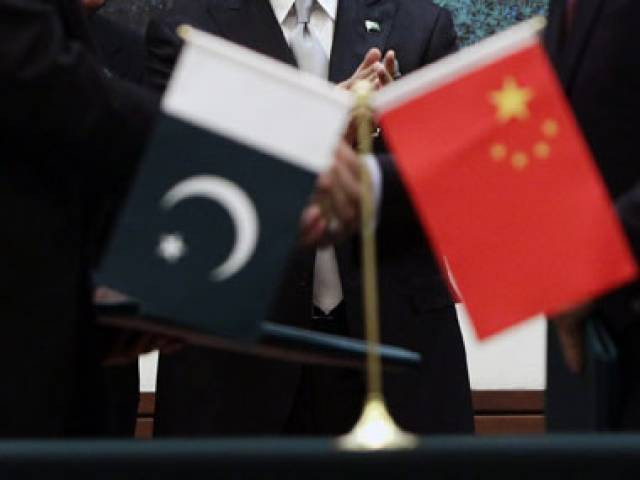Pakistan seeks $17b from China
Proposes ambitious plans to expand CPEC, requests funding for nine key projects

Pakistan requested China on Friday to begin construction work on three electricity generation projects totalling 2,100 megawatts and proposed seven infrastructure schemes for Chinese financing – in a move that appears to further expand Phase-I of the China-Pakistan Economic Corridor (CPEC).
Islamabad requested China to fund the Diamer Basha dam, Hyderabad-Sukkur motorway, and Mainline-I project of the Pakistan Railways, in addition to four other roads and bridge projects. The estimated value of these nine energy and infrastructure projects exceeds $17 billion, including the $4.5 billion cost of the energy schemes.
The request was made during the 13th Joint Cooperation Committee (JCC) meeting, the highest decision-making body of the CPEC. The Pakistani side was headed by Minister for Planning Ahsan Iqbal, while the Chinese team was led by the chairman of Beijing’s National Development and Reform Commission (NDRC) during the JCC meeting.
“We have agreed to perform the ground-breaking ceremony of three energy projects with a capacity of 2100 MW this year,” said Iqbal, while addressing a press conference. These projects include the Azad Patan power project, Kohala hydropower project, and the Gwadar coal-fired power plant, he added.
In response to a question about the rationality of adding 2,100 MW more capacity when the country is expected to pay Rs2.8 trillion in idle capacity payments in the next fiscal year, Iqbal stated that the two hydropower projects would be commissioned in the next six to eight years, by which time the electricity demand would be sufficient. He also noted the need for a 300 MW coal-fired power project to meet the needs of Gwadar and surrounding areas.
The minister mentioned that China has raised the issue of the repayment of their Rs523 billion dues on account of electricity purchases, but the country can only make these payments when the economic situation improves.
The planning minister also stated that China has agreed to study a proposal to convert imported-coal projects to local coal for coal-based power generation. This move would save $1 billion per annum in coal costs and facilitate timely payments to Chinese energy suppliers.
Iqbal further shared that the National Energy Administration of China will visit Pakistan to prepare recommendations to reduce power losses during project construction phases and to convert regular energy efficiently into green energy.
Pakistan also proposed seven infrastructure projects for Chinese financing, including the $6.7 billion Mainline-I project of the CPEC. The planning minister mentioned that the Diamer Basha Dam, Panjgor-Mashkoor road, Hyderabad-Sukkur Motorway, Zhob-Quetta road, Quetta-Karachi road, Thakot-Raikot section of the Karakoram Highway, and the Wanghu Tunnel at the M-8 motorway have also been proposed for inclusion in the CPEC.
Under Phase-I of the CPEC, China had invested $28 billion in energy and infrastructure projects. However, it seems that the government is still hoping to secure at least $17 billion more for energy and infrastructure schemes.
The government has already prepared a plan to reschedule $17 billion in Chinese energy debt amid China’s reluctance to entertain any such request.
The planning minister stated that Pakistan has revised the design of the Main Line-1 (ML-1) project from a $10 billion “high-end” to a more functional level project worth $6.8 billion. He mentioned that the ML-1 project will be constructed in phases.
Responding to a question about compromising the quality of the ML-1 project, Iqbal stated that the train’s speed will be 120 kilometres per hour but could be increased to 160 km per hour in the future.
The planning minister reiterated Pakistan’s readiness to collaborate with the NDRC to achieve “China and Pakistan’s shared vision of high-quality development.”
Iqbal mentioned several projects ready for bidding by Chinese companies and expressed hope for the immediate start of the process for the ML-1 project, the country’s largest railway scheme.
The minister further said that the “re-modified PC-1 for the upgrade of Pakistan Railways existing ML-1 and establishment of a dry port near Havelian” is proposed to be financed through foreign funding under the CPEC framework agreement.
He requested the NDRC and National Railway Administration to authorise the bidding process and establish timelines for ground-breaking.
Referring to the Karachi Circular Railways (KCR) project, he noted its expected implementation under a government-to-government (G2G) arrangement similar to the Lahore Orange Line Metro project.
The planning minister also maintained that the Gwadar port is operational along with several other infrastructure and social projects.
He emphasised the transition from G2G to business-to-business (B2B) collaborations in the next phases, focusing on high-quality development and transforming Gwadar into a business district and added that progress is ongoing in developing four priority special economic zones (SEZs).
Iqbal stressed the need to replicate Chinese expertise in setting up these SEZs, requiring support from technical experts facilitated under the recently signed industrial cooperation framework agreement. He invited Chinese manufacturers to relocate to these SEZs to benefit from Pakistan’s low-cost labour force, high return on investment, and easy access to global markets.
Pakistan has also proposed setting up two new working groups on Water Resources and a Working Group on Climate Change.
Published in The Express Tribune, May 25th, 2024.
Like Business on Facebook, follow @TribuneBiz on Twitter to stay informed and join in the conversation.



















COMMENTS
Comments are moderated and generally will be posted if they are on-topic and not abusive.
For more information, please see our Comments FAQ